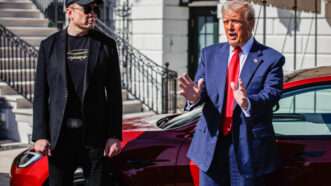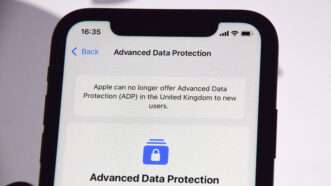Civil Liberties
Mel Gibson Controversy Highlights a Bigger Scandal: Many Americans Lose Their Gun Rights for No Good Reason
Millions of people are barred from owning firearms even though they have no history of violence, and they have essentially no recourse under current law.
Trump Declares Tesla Vandals 'Domestic Terrorists'
It's far from the first case of terrorism inflation.
Study: Age-Verification Laws Don't Work
At least not if the goal is keeping minors from viewing porn.
A Nevada Math Professor Who Was Disciplined for Criticizing Curriculum Changes Will Get His Day in Court
The 9th Circuit revived a First Amendment lawsuit by Lars Jensen, who says his community college punished him for complaining about dumbed-down courses.
The Israel-Hamas Conflict Convinced College Adminstrators To Turn Away From Politics, New Report Shows
Just eight colleges had official neutrality policies before the attack. By the end of 2024, it was almost 150.
Nevada Math Prof Alleges Discipline for "Voic[ing] Concerns About … the Math Department … Lower[ing] Its Curriculum Standards"
The Ninth Circuit allows his First Amendment claim against his community college to go forward.
Sixth Circuit Rejects Qualified Immunity for Kim Davis for a Third Time
The message that public officials are required to follow the law, even if they disagree with it, does not seem to have gotten through.
Mahmoud Khalil, the Great Rorschach Test
Plus: Ukraine attacks Russia with drones, Newsom's revisionist history, and more...
Why Do I Keep Finding Padlocked Playgrounds in New York City?
We're hemorrhaging our child population for a reason.
The Case Against Deporting Immigrants for "Pro-Terrorist" Speech [Updated]
It's both unjust and unconstitutional.
Is it Constitutional To Deport Immigrants for Political Speech?
President Donald Trump has begun kicking immigrant “Hamas sympathizers” out of the U.S.
Who Is the Palestinian Columbia Student Detained For His Protest Activity?
Several months ago, Reason interviewed Mahmoud Khalil at a protest encampment. Now he’s sitting in ICE detention.
SCOTUS to Consider Whether State Bans on "Conversion Therapy" Violate the First Amendment
A highly significant grant of certiorari for next term.
U.S. Attorney Threatens Georgetown Law for 'Teaching DEI'
The law school's dean rejected the letter, arguing the First Amendment "guarantees that the government cannot direct what Georgetown and its faculty teach and how to teach it."
May Government Refuse to Hire Notre Dame Students, Because Notre Dame Teaches and Promotes Anti-Abortion Ideology?
No? Then how can government refuse to hire Georgetown alumni, so long as Georgetown "teach[es] and promote[s] DEI"?
Anti-American Speech and Spray-Painting "Allah, Muhammad" in Storage Locker Can Be Evidence of Motive …
in prosecution for bomb hoax at church; but spray-painting "the stupid Jew" in the storage locker isn't relevant enough, and thus isn't admissible. (Both the painted items were in defendant's native Kurdish.)
Trump Is Targeting Media and Chilling Free Speech
The president campaigned on a promise to defend the First Amendment, but he's now attacking free speech through a variety of disreputable strategies.
Jay Bhattacharya's Confirmation Hearing Proves the Lockdown Skeptics Won
Trump's nominee for NIH director once stirred major controversy for criticizing lockdowns, mask mandates, and school closures. Yesterday, Senate Democrats didn't even raise the issue.
Apple Takes U.K. to Court Over Demand To Weaken Encryption
If enacted, the order would weaken digital security for Apple users throughout the U.K.
74-Year-Old Scottish Woman Arrested for Protesting Near Abortion Provider
Rose Docherty was arrested over her sign, which read: "Coercion is a crime, here to talk, only if you want."
Amy Klobuchar's Health Misinformation Act Has Aged Poorly
A proposed bill in 2021 would have put the HHS secretary in charge of censoring COVID-19 contrarianism on social media.
Weak Dollar
Plus: Columbia's Hamas apologists, Musk's lawsuit against OpenAI, and more...
FIRE Files First Amendment Lawsuit Challenging Texas A&M Drag Show Ban
Texas A&M's Board of Regents voted to ban drag shows on the grounds that they objectify women and violate state and federal policies against promoting "gender ideology."
Tort Law vs. Privacy: Ride-Share Services May Have Duty to Prevent Anonymous Riders
So the Missouri Court of Appeals concludes, in allowing a negligence/design defect case to proceed against Lyft, based on a driver's having been murdered by riders who "fraudulently and anonymously request[ed]" a ride.
Mexico Aims To Reshape the U.S. Firearm Industry by Suing Gun Makers
The Supreme Court will decide whether this threat to the Second Amendment is legally viable.
D.C. U.S. Attorney Drops Probe Over Sen. Schumer's 2020 Statements About Gorsuch and Kavanaugh
That's the correct decision, though I don't think there should even have been a question about it.
Punitive Damages Award in Mann v. Steyn Reduced from $1M to $5K,
largely because the compensatory damages were just $1.
Education Department Clarifies Anti-DEI Guidance
The department insists its directive will not suppress First Amendment rights.
Can Publicizing a Person's "Address and Physical Appearance" in Connection with True Allegations of Misconduct Be Actionable?
A federal magistrate judge flags the issue, though doesn't purport to resolve it.
The Social Cost of Nullifying the Right to Arms: The Case of Mexico
If the Mexican executive branch obeyed the Mexican Constitution, the Mexican people would be safer
Supreme Court Refuses to Consider Whether University "Bias-Response Teams" Chill Speech
Justice Thomas dissents from the Court's refusal to resolve a clear circuit split.

























